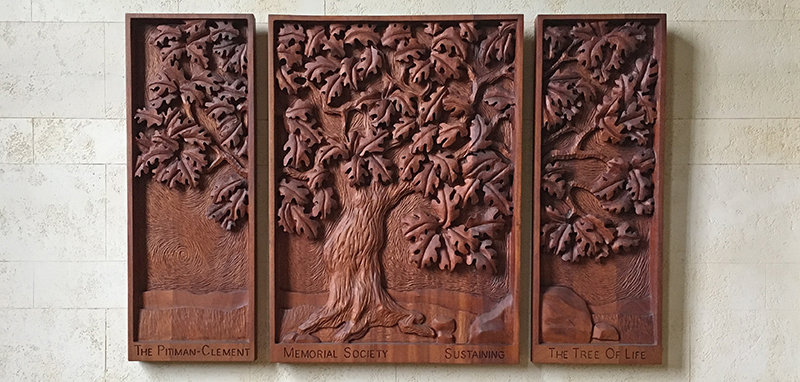
First Universalist Church is powered almost entirely by financial gifts from people like you. There is no denominational structure that supports this church, no large endowment that underwrites our budget. We exist because, for 165 years, people like you have supported this church financially and invested in our existence so that First Universalist could serve the needs of the present, and build bridges toward the future. Be a part of making this year happen by making a gift today.
Planned Giving
Join the Heritage Circle at First Universalist Church.
We invite you to consider including a gift to the church as part of your estate planning. These gifts will help support the long-term financial stability of the church and ensure the preservation of our values for “times we shall never see.”

The Heritage Circle
The Heritage Circle is an expanding group of First Universalists who have decided to invest in the church after their death through planned giving. Planned giving refers to the ways to designate First Universalist as a beneficiary of your estate, either in your will or through other means such as an IRA, 401K, or stocks. People from all class backgrounds, all income levels and all ages are part of the Heritage Circle. Each and every investment, regardless of size, makes an enormous difference in creating a vibrant future for our church.
When asked why they chose to include the church in their financial plans, Heritage Circle members expressed some consistent themes, notably their desire to participate in the long-term continuation of:
- Our sense of community, which can be depended on in difficult times
- Our commitment to social justice
- Our challenge to individual and spiritual growth
As part of an interconnected community, many of us want to leave a legacy of love and support that outlasts a lifetime. We have a vision of our children’s children, of those to come who we may not know now but who are part of us, and we want to leave the world a little bit better for future generations. The Heritage Circle ensures that our church can sustain itself over time and create the resources we need to be here for generations to come. We deeply appreciate Heritage Circle members who invest in First Universalist beyond their own lifetimes, and we invite you to join through your own investment.
Making a Planned Gift
The Unitarian Universalist Association (UUA) offers information on its website that may serve as a useful resource as you consider including First Universalist in your estate planning process. UUA Planned Giving Resources
To speak with someone about making a planned gift to First Universalist, call our Bookkeeper, Jie Wronsky-Riley at 612-405-5502. For details about your personal planned giving, we urge you to consult with your financial advisor or lawyer.
If you have already included the church in your estate plans, please let us know so you can be recognized as a Heritage Circle member and invited to Heritage Circle events, including an annual recognition luncheon. The best way to let First Universalist know that it is included in your estate plan, is to complete and submit a “Letter of Intent for Future Gift” form to the church office, if you have not done so already.
The First Universalist Church is an IRS-qualified 501(c)(3) organization. We are a member in good standing of the Unitarian Universalist Association. First Universalist’s federal identification number (FEIN) is 41-0696900. A completed IRS Form W-9 Request for Taxpayer Identification is available upon request. For tax purposes, bequests, legacies, devises, or transfers to the Church are deductible as they accord with the provision of the Internal Revenue Code Section 2055(a) and related regulations.
The Planned Giving Committee has put together some basic information on how to make a planned gift to First Universalist Church:
Types of Bequests
Unrestricted Bequest: This type of bequest is especially appreciated because it gives the Church maximum flexibility. The Church’s Board of Trustees sets the policy with regard to usage of Unrestricted Bequests. The Legacy Fund was established as the default repository for “unrestricted bequests.” Learn more about the Legacy Fund below.
Restricted Bequest: The Church welcomes restricted gifts, and a member of the Planned Giving Team can assist you in crafting language that is appropriate for your intentions. We suggest that you consider designating your bequest for one of the following Funds:
- Legacy Fund: an invested fund whereby annual distributions are not to exceed seven percent of the fair market value of the fund as determined by the Board of Trustees. It is expected that there will be many years when less than seven percent is distributed. Church Bylaws allow that upon recommendation of the Board of Trustees and a two-thirds approval of the members voting on resolution, more than seven percent may be distributed. View our Legacy Fund Policy.
- Cummins Fund: an invested fund whereby annual distributions will help ensure that First Universalist remains a teaching church, providing internships for UU ministerial students, in honor of our Minister Emeritus, Reverend John Cummins.
- First Universalist Foundation: an invested fund that makes grants to support the social justice efforts of non-profit community-based organizations and to First Universalist Church for its Social Justice efforts.
Investment policies for the Legacy Fund, Cummins Fund, and the Foundation are available upon request.
How to Make a Bequest
Both unrestricted and restricted bequests are made in the following ways:
Testamentary Charitable Remainder Trust: This is a tool to consider if you wish to provide for someone after you die, and want to provide a charitable gift too. A trust document is created during your lifetime, with a “pour-over” will to designate which assets are to be placed in a trust with income paid to one or more beneficiaries for their lifetimes. Upon the death of the last income recipient, or after a term of a specified number of years, the trust terminates and assets are transferred to First Universalist Church, completing your gift.
Specific Bequest: A specific asset or collection of assets, in the form of cash, securities, or other property. Retirement plan benefits, IRAs, savings bonds, and other items known as “income with respect to the decedent” (IRD) are particularly tax effective gifts to charity. You may designate an amount or a percentage of the property. Designating First Universalist as a beneficiary of your IRA is a particularly easy and inexpensive way to make a planned gift to the Church.
Residuary Bequest: All or a percentage of what remains of your estate after all specific bequests have been satisfied and debts and expenses have been paid. You may specify that charitable gifts be fulfilled first with IRD assets to the extent needed to reduce your tentative estate.
Contingent Bequest: Gives all or a portion of your estate in the event that a named beneficiary is not alive when you die. This type of bequest can avoid costly litigation or prevent property from reverting to the state for lack of heirs.
Helpful Language for writing requests
General Bequest: I give all my real and personal property to First Universalist Church, a Minnesota Charitable corporation, located at 3400 Dupont Avenue South in Minneapolis, Minnesota, for its unrestricted use.
Specific Bequest: I give ($ amount, description of property, or % of real estate) to First Universalist Church, a Minnesota charitable corporation, located at 3400 Dupont Avenue South, in Minneapolis, Minnesota, for its unrestricted use.
Residuary Bequest: I give all (or %) of my remaining assets of any kind to First Universalist Church, a Minnesota charitable corporation, located at 3400 Dupont Avenue South, in Minneapolis, Minnesota, for its unrestricted use.
Restricted Bequest for a Specific Purpose: I give ($ amount, description of property, or % of real estate) to First Universalist Church, a Minnesota charitable corporation, located at 3400 Dupont Avenue South, in Minneapolis, Minnesota, restricted to (describe or name a First Universalist Fund or Program). If at any time in the judgment of the First Universalist Board of Trustees it is deemed impossible or impractical to carry out the above purpose, the Board of Trustees shall have the power to modify or eliminate any restriction, condition, limitation or trust imposed with respect to any funds or property the title to which has become vested in this corporation if, in the sole judgment of the Board of Trustees, such restriction, condition, limitation or trust becomes unnecessary, incapable of fulfillment or inconsistent with the charitable needs of the community or area served by the corporation.